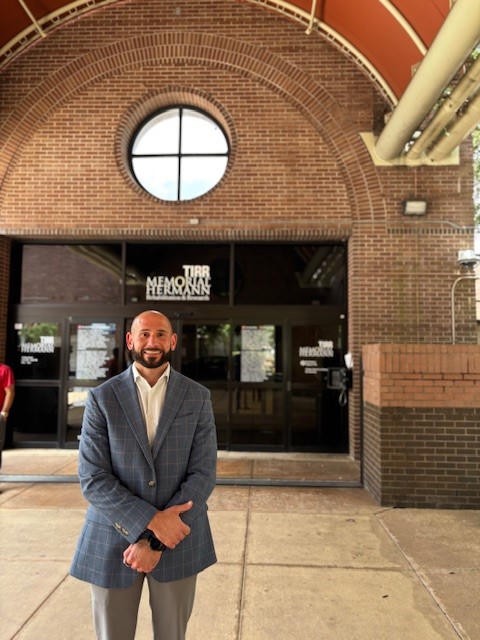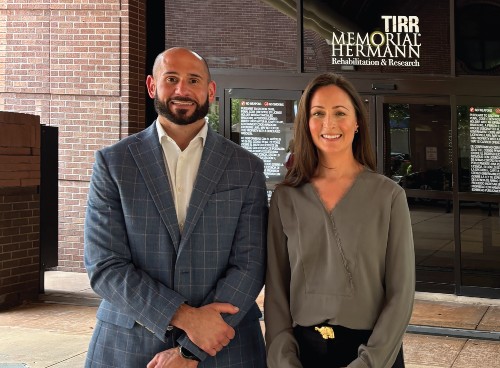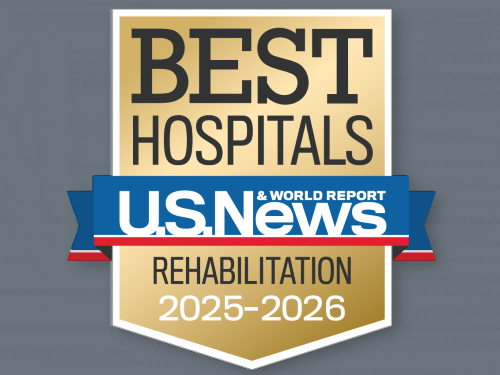 Christopher M. Falco, MD, has served as the clinical chief of the Neurobehavioral Program at TIRR Memorial Hermann since 2015, and as an attending physician since 2014, with a particular focus on brain injury and stroke rehabilitation.
Christopher M. Falco, MD, has served as the clinical chief of the Neurobehavioral Program at TIRR Memorial Hermann since 2015, and as an attending physician since 2014, with a particular focus on brain injury and stroke rehabilitation.
Having also completed his residency and fellowship training at TIRR Memorial Hermann, Dr. Falco has since focused his clinical work on brain injury and stroke patients, particularly those with neuropsychiatric disorders, meaning that he is actively engaged in providing important care services to those who are often underserved elsewhere.
The TIRR Journal caught up with Dr. Falco to ask him about one of TIRR Memorial Hermann’s most important clinical initiatives, the Neurobehavioral Program.
You’ve actually served as the clinical chief of the Neurobehavioral Program for most of your time at TIRR Memorial Hermann. What is this program and why is it significant?
Dr. Falco: I was involved in creating the program and it was really born out of necessity. TIRR Memorial Hermann has always admitted patients with severe traumatic brain injuries, and behavior concerns such as agitation are a common presentation in this patient population. The overall philosophy for our program, which is a little bit different from what you’ll find in most other rehab facilities, is that it prioritizes cognitive recovery above all else, even over the behavioral issues. We structure our treatment plans, both pharmacological and nonpharmacological, around promoting and supporting cognitive recovery.
What does this mean from a patient care perspective?
Dr. Falco: When you think about the most severely agitated patients, they are going to require medication management. The vast majority of rehabilitation programs will use sedating medications as a method to keep patients and staff as safe as possible. Our philosophy is a little bit different in that, because of the expertise and comfort level we have with this patient population, we know how to manage them and keep everyone safe, without having to use heavily sedating medications. We know that if we can guide the patient through the early stages of their recovery, when neurobehavioral problems are still very acute, and if we improve their cognitive function to the point where they begin to understand what’s going on and recognize why they’re in the hospital, their behavior can get dramatically better on its own. At the majority of other rehabilitation facilities, patients aren’t going to be afforded that opportunity. They will get loaded up on sedating medication, which will likely decrease the agitation, but will almost certainly also delay cognitive recovery.
TIRR Memorial Hermann’s overall philosophy is to return patients to their communities and normal daily activities as quickly as possible. So, your approach here, would it in effect be in keeping with that idea?
Dr. Falco: Absolutely. It’s very much in line with our overall hospital-wide philosophy: Get patients better, get them back home, back to the community, back to the people they love and care about and who can care for them, and avoid keeping them in facilities any longer than they truly need to be.
A lot of what you and your colleagues do also engages families and caregivers in the process, right? Can you talk a little about that, and maybe about some of the consultation that you provide family and caregivers as well?
Dr. Falco: For any patient who is admitted to TIRR Memorial Hermann, there’s going to be a lot of communication with family. We’re always going to want them involved as early as possible, both to give them a sense of what we’re trying to accomplish, and also to begin preparing them to take their loved ones home. My colleague and co-leader of this program, clinical neuropsychologist Dr. Lindsey Harik, is the program manager for the Neurobehavioral Program, and she and I make every effort when a patient is first admitted to meet with the family very early in their stay. This initial meeting is super helpful for us to get to know more about who the patient was prior to their injury, which then helps us to understand and identify reasons why the patient might be experiencing the behavioral challenges we are now seeing. We also use this meeting as an opportunity to give the family extensive information about our treatment plan and our expectations, and to set the stage for what will happen over the remainder of the patient’s time at TIRR Memorial Hermann. We also go out of our way to answer any questions they might have about the program and our treatments. It’s probably more information than they can truly digest, but we find it helpful to be very transparent in what we are trying to accomplish, especially the emphasis on promoting cognitive recovery while concurrently managing these challenging behaviors. We then have a lot of additional checkpoints with families over the rest of the stay, both to see how things are going from their perspective and to make sure they are comfortable with the continuing treatment plan.
 You mentioned Dr. Harik earlier. Can you talk a little bit more about the team in the Neurobehavioral Program?
You mentioned Dr. Harik earlier. Can you talk a little bit more about the team in the Neurobehavioral Program?
Dr. Falco: We have an amazing team, and yes, excellence starts at the top with Dr. Harik. She is truly one of the nation’s leading experts on managing this patient population, and the success of our program is directly linked to her incredible leadership. We then have a group of dedicated neurobehavioral therapists from PT, OT and speech therapy, all of whom have extensive knowledge and experience working with the neurobehavioral patient population. It’s important that the therapists who are treating patients with these potentially unsafe behaviors have the necessary skillset and comfort level to do so, and our group of neurobehavioral therapists are just phenomenal. The nursing staff is also paramount, including the patient care technicians, because they’re the ones tasked with caring for these patients and keeping them safe around the clock. Most of the time, these patients require a one-to-one sitter, and our nurses and techs are truly the all-stars in managing these patients. Knowing they will keep the patient safe using their behavior management skills gives me, as the physician, the luxury of not having to use sedating medications which, again, will only interfere with the big-picture recovery process.
In general, what does it say about TIRR Memorial Hermann that it has this dedicated program for these patients?
Dr. Falco: I think it says that we have a level of expertise that you’re not going to find anywhere else. We have the ability to safely and competently manage patients with remarkably severe neurobehavioral disorders, patients that many other facilities simply can’t take on. We are not at all intimidated or apprehensive about working with this challenging patient population, and we are very confident that we can adequately and safely manage them so that they ultimately can experience the best recovery possible.
